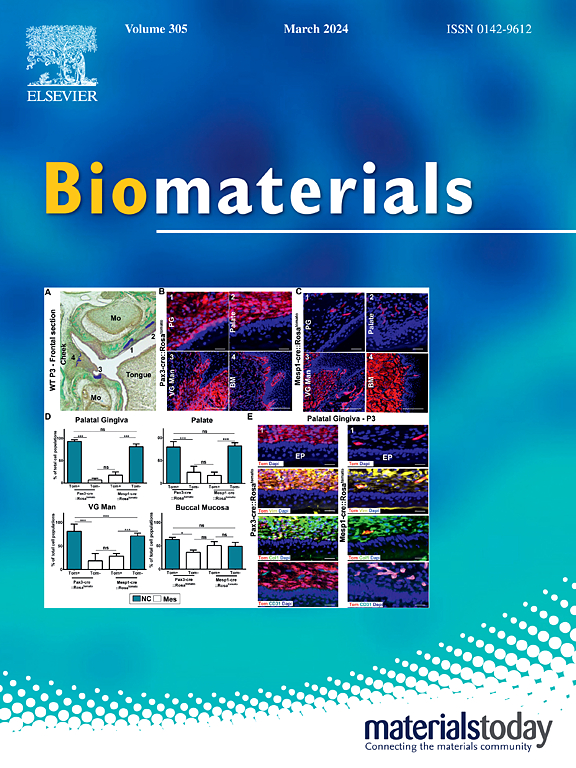mx酶增强水凝胶通过在类风湿关节炎管理中的多维调节来增强干细胞治疗
IF 12.9
1区 医学
Q1 ENGINEERING, BIOMEDICAL
引用次数: 0
摘要
类风湿性关节炎(RA)是一种毁灭性的自身免疫性疾病,给世界各地的社区带来健康和经济负担。尽管干细胞移植已成为治疗类风湿性关节炎的一种有前景的选择,但以活性氧/氮(ROS/RNS)升高和缺氧(O2)供应不足为特征的骨免疫微环境会降低治疗效率。为了解决这个问题,我们提出了一种纳米酶增强水凝胶,旨在通过“化敌为友”的策略来调节免疫微环境,从而提高干细胞治疗RA的效果。这种水凝胶清除过量的ROS/RNS,同时协同产生O2,使其成为骨髓间充质干细胞(BMSCs)的有效保护载体。此外,它成功地诱导巨噬细胞从M1表型向M2表型极化,并促进骨髓间充质干细胞的成骨分化,即使在不利的氧化条件下。此外,在严重的兔类风湿性关节炎模型中,水凝胶介导的干细胞治疗被证明可以减轻滑膜炎症的加重,促进骨重塑。该研究为增强干细胞治疗在RA治疗中的效率提供了一条有希望的途径,并为干细胞治疗甚至超越自身免疫性疾病提供了翻译意义。本文章由计算机程序翻译,如有差异,请以英文原文为准。

MXenzyme-reinforced hydrogel enhances stem cell therapy through multidimensional regulation in rheumatoid arthritis management
Rheumatoid arthritis (RA) is a devastating autoimmune disorder that imposes health and economic burdens on communities worldwide. Although stem cell transplantation has emerged as a promising option for RA management, the osteoimmune microenvironment that characterizes elevated reactive oxygen/nitrogen species (ROS/RNS) and poor oxygen (O2) supply compromise therapeutic efficiency. To address this issue, we present a nanozyme-reinforced hydrogel designed to modulate the immune microenvironment using a 'turning foes into friends' strategy, thereby enhancing the outcomes of stem cell therapy in RA. This hydrogel scavenges excessive ROS/RNS while synergistically generating O2, making it an effective protective vehicle for bone marrow-derived mesenchymal stem cells (BMSCs). Moreover, it successfully induces macrophage polarization from the M1 to the M2 phenotype and facilitates the osteogenic differentiation of BMSCs, even under hostile oxidative conditions. Furthermore, hydrogel-mediated stem cell therapy is demonstrated to attenuate the onset of exacerbated synovial inflammation and promote bone remodeling in a severe rabbit RA model. This study offers a promising avenue for augmented stem cell therapy efficiency in RA management and provides translational significance for stem cell-based therapy even beyond autoimmune disorders.
求助全文
通过发布文献求助,成功后即可免费获取论文全文。
去求助
来源期刊

Biomaterials
工程技术-材料科学:生物材料
CiteScore
26.00
自引率
2.90%
发文量
565
审稿时长
46 days
期刊介绍:
Biomaterials is an international journal covering the science and clinical application of biomaterials. A biomaterial is now defined as a substance that has been engineered to take a form which, alone or as part of a complex system, is used to direct, by control of interactions with components of living systems, the course of any therapeutic or diagnostic procedure. It is the aim of the journal to provide a peer-reviewed forum for the publication of original papers and authoritative review and opinion papers dealing with the most important issues facing the use of biomaterials in clinical practice. The scope of the journal covers the wide range of physical, biological and chemical sciences that underpin the design of biomaterials and the clinical disciplines in which they are used. These sciences include polymer synthesis and characterization, drug and gene vector design, the biology of the host response, immunology and toxicology and self assembly at the nanoscale. Clinical applications include the therapies of medical technology and regenerative medicine in all clinical disciplines, and diagnostic systems that reply on innovative contrast and sensing agents. The journal is relevant to areas such as cancer diagnosis and therapy, implantable devices, drug delivery systems, gene vectors, bionanotechnology and tissue engineering.
 求助内容:
求助内容: 应助结果提醒方式:
应助结果提醒方式:


